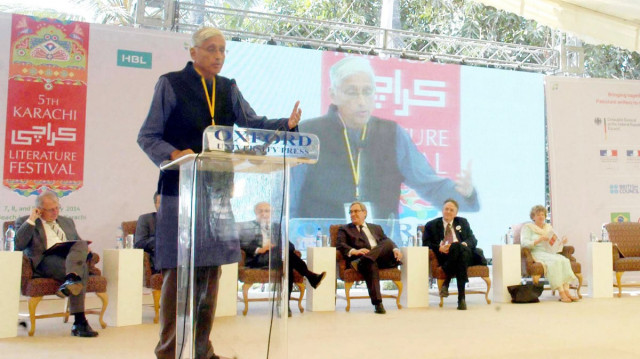In conversation with Rajmohan Gandhi
Gandhi said that most versions of Pak-India history spewed hatred, there was more of focus on what politicians did.

Rajmohan Gandhi during the Karachi Literature Festival. PHOTO: RASHID AJMERI/EXPRESS
“We are done with the politicians of India and Pakistan,” said the 80-plus Indian scholar. “If Pakistan and India want to see better ties, the people need to do more of what they are doing now. We need to meet, talk and be cordial.”
The session, moderated by history scholar and twice-serving former education minister of Sindh Hamida Khuhro and renowned historian of South Asia, Sara Ansari, turned fiery after some quick, formal welcome messages to the guest in a matter of no time.
A visibly charged-up lady from the audience said: “Yes! I was nine when India and Pakistan split. And I am still waiting for better ties. Will it ever happen in my lifetime?”
Gandhi, who began answering her by reiterating the need for people-to-people contact, had barely finished talking when a particularly truculent query came reeling forth to nip all the talk of ‘better ties’ in the very bud. “Can India stop cutting down on our waters? What you do you want to do, have us all die of thirst?” The gentleman, who had spoken in crisp Urdu, was aged, wore an embroidered cap and invited several chuckles.
It was clearly time to instill some ‘moderation’: “I do not think this question fits in this forum,” said Khuhro.
Gandhi, who was in great humour, pitched in calculatedly: “Aap ki Urdu bohat achi hai, janab.”
Mohandas Gandhi’s grandson, in a matter of a mere half an hour, had already conversed in Gujarati, Urdu and English. Following a overview of his work on Punjab’s history and his biography of the revered Pashtun leader Bacha Khan, the discussion steered to the ever-contentious Radcliffe Award inviting more difficult questions from the audience.
“People in both India and Pakistan think that it was Cyril Radcliffe who penciled the Pak-India border; the truth is, that he only did that, because the Muslims and Hindus on the commission kept on cancelling each others’ suggested lines.”
“So firmly enshrined were they in their communal cocoons that it never occurred to them that a better idea would be to debate and evolve a consensus on what the border should actually be like.”
At this point, a gentleman from the audience chimed in mischievously: “But, sir, what role did Lady Mountbatten play in the chalking of the border?”
In the midst of uproarious laughter at this tongue-in-cheek reference to Edwina Mountbatten and Jawaharlal Nehru’s fateful romance, Gandhi shook his head, “I have no information on this.” Khuro teased, “But sir, she must have played some role.” But Gandhi adamantly refused to comment.
Skewed versions
Earlier in the session, Gandhi said that most of the versions of Pak-India history spewed hatred, there was more of focus on what politicians had done and less on how people from all communities had equally suffered.
“Can we say that people suffered because the Partition was rushed into? Because politicians had not planned well?” Questioned Khuhro.
“Absolutely!” said Gandhi.
Historian Sarah Ansari pointed out: “Perhaps it would help if Indians research Pakistan history and Pakistanis research Indian history.”
Gandhi agreed that such ventures would foster peace.



















COMMENTS
Comments are moderated and generally will be posted if they are on-topic and not abusive.
For more information, please see our Comments FAQ